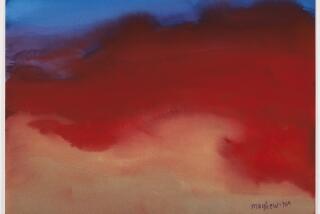Non-Mainstream Pop From N.Y., Africa and Australia
In the days before Madonna and CD’s and Federal Express, port cities were the places where intriguing musical juxtapositions were usually forged, since the local musicians there were constantly exposed to music from far-flung locales.
Now, technology enables musicians all over the world to keep abreast of the latest sounds and styles, and those juxtapositions--particularly those rising from contact between traditional styles and Western pop sounds--take more varied forms. That’s the focus of this edition of On the Off Beat, a periodic review of roots, ethnic and non-mainstream pop music from around the world.
*** 1/2 JOHN ZORN, “Spy Vs. Spy,” Elektra/Musician.
*** 1/2 JOHN ZORN, “Naked City,” Elektra/Nonesuch. Saxophonist Zorn, a leading figure on New York’s experimental music scene, positively revels in juxtapositions. With “Spy Vs. Spy,” it’s “acoustic hard-core” versions of Ornette Coleman’s compositions--i.e., no electric instruments but performances characterized by the high-octane energy of punk. It works, since Zorn and fellow alto man Tim Berne are too smart and skillful to lose the bluesy threads of Coleman’s melodies in the rampaging rhythm section.
In the electric “Naked City,” the juxtapositions are in the compositions and arrangements--like Zorn playing the mournful melody to Coleman’s “Lonely Woman” over a rhythm section digging into Roy Orbison’s “Pretty Woman” riff. A stellar quintet negotiates the hairpin turns as Zorn zips through genres--’60s instrumental rock, hard-core blasts, ‘50s R&B;, avant-noise, lush movie themes, monster metal riffing--like someone channel-hopping with a TV remote-control unit.
** VARIOUS ARTISTS, “Bhangra Now,” Multitone.
*** VARIOUS ARTISTS, “Bhangra Power,” Multitone (both English imports). What is Bhangra pop? Apparently it’s a hybrid of reggae, pop, dance and Indian sound-track music developed by Indian and Pakistani teen-agers who grew up in England. On “Bhangra Now,” spirited romps like “Gurdh Nalo Isqh Mitah” have a Middle-Eastern tinge reminiscent of Algeria’s rai music, while “Bhangra Rap” resembles soca more than hip-hop. Most of the artists on “Bhangra Now” don’t sound like they have a grip on Bhangra pop as a coherent style.
They do on “Bhangra Power.” From the opening salvo of go-go rhythms topped by the cascading Indian melody line of “Bhangra Paa Ni Bhangra Paa,” the arrangements are tighter and the overall performances more confident.
**** MAHMOUD AHMED, “Ere Mela Mela,” Hannibal. A collection of tracks recorded between 1975 and ’78 by the veteran Ethiopian pop star and available for the first time here. Ahmed’s cutting, spiraling vocals fall in the Islamic pop mode and the strong blues/R&B; flavor achieves a flowing groove with moody undercurrents. Fascinating stuff.
** 1/2 ROSSY “Madagascar,” Celluloid/Melodie import. Rossy is a youthful septet from Madagascar whose “Raha Manina Anay” on a GlobeStyle compilation a few years ago was a revelation. On this double album, Rossy’s unusual blend of acoustic guitars and clattering percussion lays down grooves that somehow sound both choppy and flowing while layered vocals create appealingly ragged-but-right harmonies. The arrangements have traces of South African mbqanga, reggae and other Caribbean styles, and an exuberance reminiscent of ‘50s rock.
* 1/2 GONDWANALAND, “Let the Dog Out,” WEA Australia import. Great idea--combine the aboriginal instrument the didgeridu, which sounds something like a deep-pitched, organic synthesizer, with high-tech keyboards and percussion. But the execution falls short on this Australian instrumental trio’s 1988 release. Charlie McMahon’s didgeridu is occasionally hemmed in by Eddy Duquemin’s percussion, but the empty bombast of Peter Carolan’s pomp-rock keyboard melodies is the biggest problem. The atmospheric pieces work better, but Gondwanaland should figure out more creative ways to prominently feature the didgeridu.
More to Read
The biggest entertainment stories
Get our big stories about Hollywood, film, television, music, arts, culture and more right in your inbox as soon as they publish.
You may occasionally receive promotional content from the Los Angeles Times.










